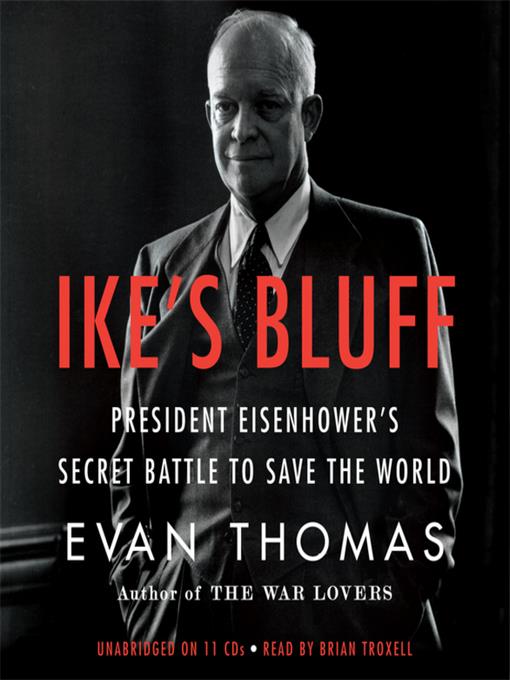
Ike's Bluff
President Eisenhower's Secret Battle to Save the World
کتاب های مرتبط
- اطلاعات
- نقد و بررسی
- دیدگاه کاربران
نقد و بررسی

July 9, 2012
Often derided as an inattentive national grandfather, Eisenhower emerges as a subtle, sharp-witted master statesman in this probing study of his foreign and security policies. Historian Thomas (The War Lovers: Roosevelt, Lodge, Hearst, and the Rush to Empire, 1898) paints a colorful, richly detailed portrait of a man whose habit of hiding his cutting intellect, volcanic temper, and poker-player’s instincts behind public grins and vague pronouncements amounted to a profound political strategy. Eisenhower’s low-key nuclear brinkmanship anchors the book. Thomas argues that Ike’s deliberately ambiguous statements about using nuclear weapons caused the Soviets and Chinese to back off. His duplicity and indirection prevailed in everything from the Suez Crisis to his battle against bloated defense budgets. The result, Thomas contends, was an audacious geopolitical gamble: while dreading the destructiveness of nuclear weapons, Ike embraced a doctrine of massive retaliation that put nuclear war at the heart of American strategy—and then adroitly used it to defuse military confrontations. Thomas’s appreciation of Eisenhower is sometimes too sunny; he says little about Ike’s approval of CIA-sponsored coups in Iran and Guatemala and the troubled interventionist path they charted. Still, his vivid, compelling profile of Eisenhower—the man and the shrewd operator—should spark reconsideration of his presidency. Photos. Agent: Amanda Urban, ICM.

July 15, 2012
The beatification of President Dwight Eisenhower continues in this keen character study. Often viewed as trustworthy but bland, Eisenhower didn't let on what was really roiling behind the comforting exterior, as Thomas (Writing/Princeton Univ.; The War Lovers: Roosevelt, Lodge, Hearst, and the Rush to Empire, 1898, 2010, etc.) effectively argues in this chronological look at his presidency. In fact, atomic war loomed: The hydrogen bomb was being routinely tested to the obliteration of Pacific atolls, while the Joint Chiefs of Staff were itching to provoke the Soviet Union and hot spots in Korea, China, Suez and Berlin were offering an opportunity. If anyone knew the devastation of war, Supreme Allied Commander Eisenhower certainly did. While he avoided initial calls to jump into the presidential fray, he was convinced that only he could keep the country secure and at peace; he assumed the duty personally, and the physical burden ruined his health. Thomas emphasizes Ike's mastery at bridge, not because he had consistently good hands but because he could bluff. As he had learned through his World War II strategic command, he promoted an all-or-nothing approach to crises, standing cautious yet willing to throw everything in if required for victory. Tellingly, he moved the stockpiling of atomic weapons from the civilian Atomic Energy Commission to the military, and he did not concern himself with alleviating public hysteria over the threat of atomic warfare. Yet from crisis to crisis, he maintained a "healthy skepticism about the grandiose schemes of the military," leading him to close his presidency with his haunting warning about the "military industrial complex." Thomas ably demonstrates how operating through indirection became Ike's effective peacekeeping strategy. An astute, thoroughly engaging portrayal.
COPYRIGHT(2012) Kirkus Reviews, ALL RIGHTS RESERVED.

April 15, 2012
Apparently a crack poker player, Eisenhower took a big, poker-faced gamble when as President he confronted the Soviet Union, China, and his own saber-rattling generals. Former Newsweek editor at large Thomas explains how his careful strategy paid off--for him and for the world.
Copyright 2012 Library Journal, LLC Used with permission.

September 1, 2012
Recent biographies quote Eisenhower as saying, about avoiding WWIII in the 1950s, that it didn't just happen, by God. Thomas undertakes to unpack Ike's meaning. As the title implies, Eisenhower exuded ambiguity, often in his famously mangled grammar, about whether he would ever unleash nuclear weapons. America's Communist adversaries could not be certain, nor, as Thomas illustrates in his accounts of Cold War hot spots like Korea, Indochina, Formosa, and Berlin, could even his closest advisors, that he would not push the button in a crisis. Arguing that maintaining such uncertainty was intentional, Thomas compares Ike's methods to his passion for playing poker and bridge, which involve deception and anticipation of opponents' moves. The strain of the pretensethat is, Thomas is not convinced Eisenhower ever would have used the atom bombseemed to aggravate his explosive temper, visible in many anecdotes Thomas lifts from diaries by Ike's doctor and secretary. Generally approving of Eisenhower's ways of warding off the apocalypse, Thomas' study boosts the upward trend of Eisenhower's reputation in recent scholarship.(Reprinted with permission of Booklist, copyright 2012, American Library Association.)

























دیدگاه کاربران